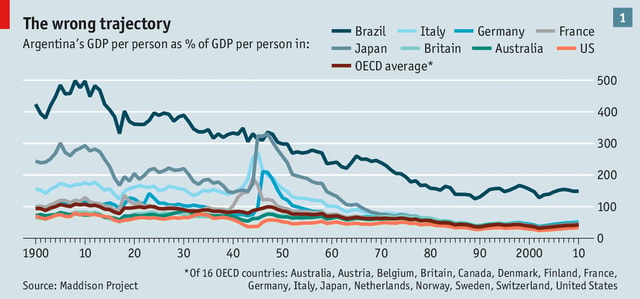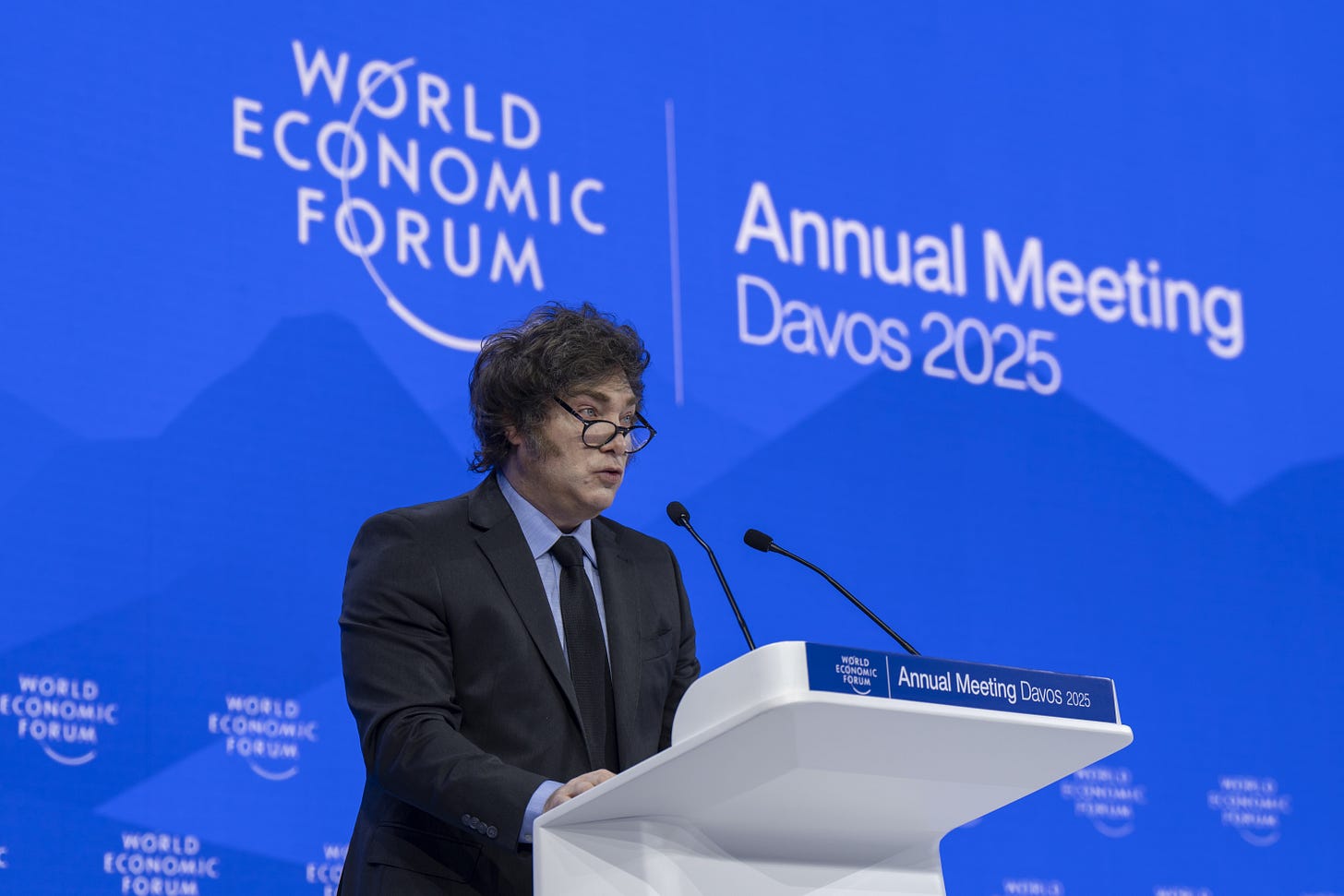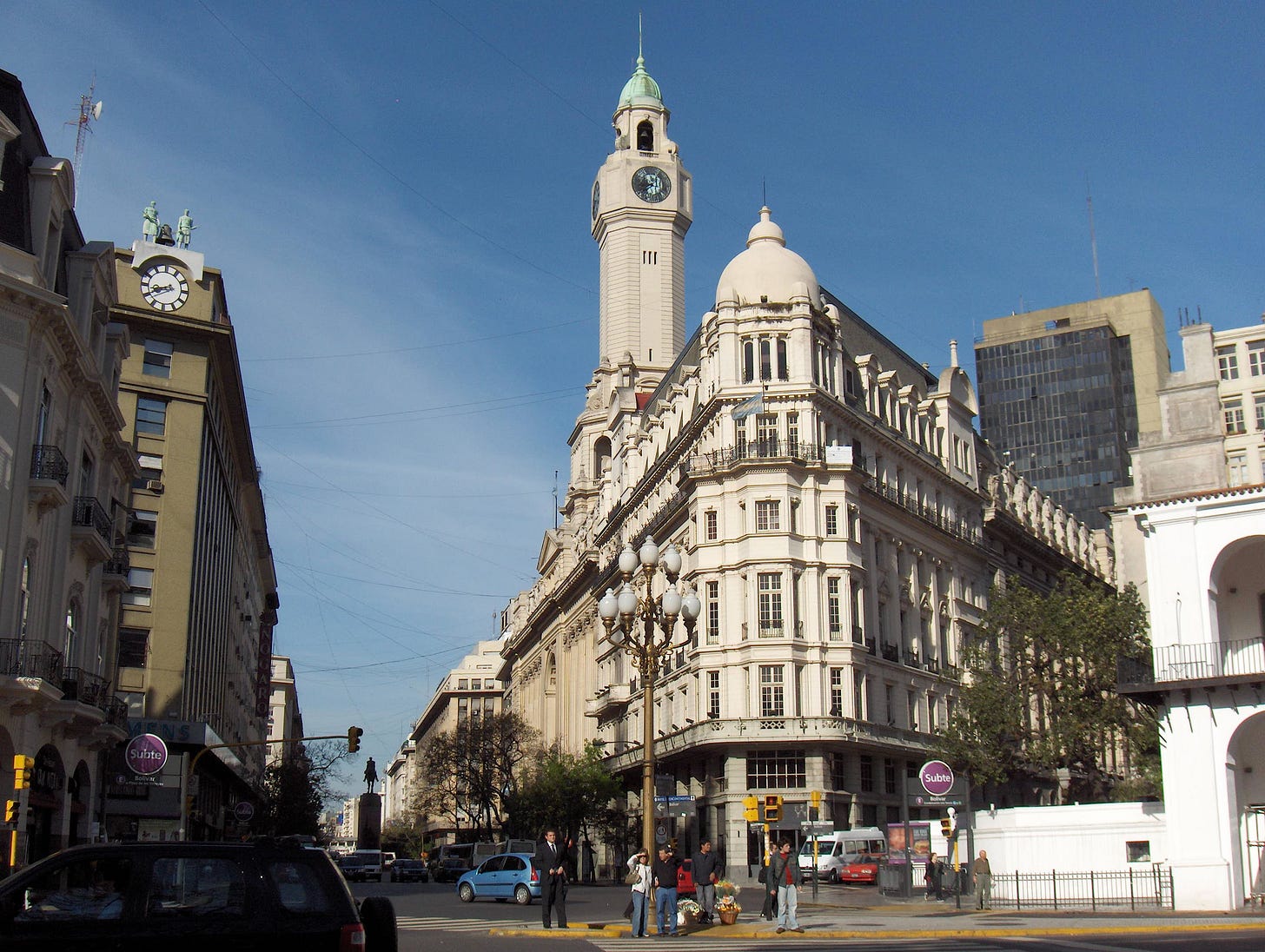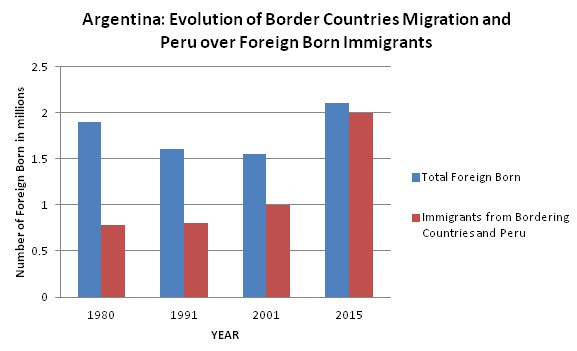Multiple decades of rampant corruption and economic under-performance in Argentina played a large role in Javier Milei’s resounding electoral victory on October 22, 2023 when he thoroughly routed his rival Sergio Massa by a 56 to 44 margin.
Argentina used to be one of the world’s most prosperous countries. It was the 10th wealthiest country in the entire world in 1913, which put it ahead of France, Germany, and Italy.

This was no coincidence. Demographically speaking, over 80 percent of its population was of white European extraction, hailing largely from Italy, Germany, Spain, France, and the United Kingdom.
These migrants journeyed all the way to Argentina towards the end of the 19th century and played a critical role in turning the capital city of Buenos Aires into the “Paris of South America” with its teeming high culture and vast wealth.
However, the country’s fortunes took a turn for the worse toward the middle of the 20th century when populist leader Juan Domingo Perón attained power in 1946.
The conventional wisdom among free market historians is that Perón’s government interventions in the Argentine economy set the stage for the country’s perennial bout with economic instability.
The focus on Argentina’s economic policies as the primary drivers of its decline paint an incomplete picture, however. Argentine writer Gustavo Semeria painted a bone-chilling picture of his country’s multi-decade decline in his April 2017 American Renaissance piece ”Argentina: A Mirror of Your Future.”
He observed that white immigration to Argentina plummeted after Perón was deposed in a coup in 1955. Instead, the country began to receive more Amerindian and Mestizo immigrants from countries such as Bolivia, Chile Colombia, Paraguay, and Peru.
This relentless wave of non-white immigration transformed the country from a pan-European polity into another multiracial state in Latin America, where roughly 40 percent of its population is non-white.
Milei’s Free-Market Economic Reforms
Multiple years of economic stagnation coupled with the harsh realities of Argentina’s changing racial demographics created a massive voting bloc of discontent that helped propel Milei to victory. Milei is a self-styled “anarcho-capitalist” with a libertarian desire to downsize the state. When he assumed the presidency, Milei confronted a 200 percent inflation rate, 40 percent of the Argentines living in poverty, and burgeoning public debt.
Once he was firmly settled in the Casa Rosada (“Rose House” is the Argentine equivalent of 1600 Pennsylvania Ave.) Milei slashed spending by 30 percent and generated a fiscal surplus after one month in office.
The monthly inflation rate dropped from 25 percent in December 2023 to 2.7 percent in October. In a similar token, Milei dropped the hammer on the country’s bloated regulatory state. During his first year in office, Milei issued over 670 deregulation decrees.
One of Milei’s most notable reforms was his elimination of the INADI (National Institute against Discrimination, Xenophobia and Racism), which is notorious for policing free speech in the country. Previously, Milei accused INADI of engaging in “ideological persecution” and making concerted efforts to “govern the way we speak.” On Feb. 22, 2024, Milei’s government announced its plans to shutter INADI as part of a comprehensive campaign to reduce the size of the state. By the end of 2024, Milei had fired 30,000 state employees and slashed energy and transportation subsidies. Overall, Milei reduced the number of government ministries from 18 down to eight.
Milei’s Immigration Blindspot
With respect to immigration, Milei abides by Milton Friedman’s maxim that mass migration can be beneficial to a country if there is no welfare magnet that attracts unproductive immigrants. As long as the welfare state is abolished, Milei and his libertarian ilk believe that only high-skilled, productive migrants will come and add value to the country.
Naturally, Milei has sought to charge foreigners for attending state universities and public hospitals in addition to strengthening the requirements for foreigners who want to enter the country and redefining the grounds for kicking immigrants out of the country.
Milei spiced things up in a speech he gave before the World Economic Forum on Jan. 23, 2025 where he argued that wokeism has distorted immigration’s purported benefits. He parroted the common multicultural canard that immigrants have made countries such as Argentina and the United States great and economically prosperous. However, he believes Western countries have been recently bringing immigrants into their countries out of “guilt” as opposed to national interests.
The Argentine president argued that because the “West is supposedly the root cause of all of the world's evils in history, it must redeem itself by opening its borders to everyone, which leads to a form of reverse colonization that resembles collective suicide.” Milei added, “So, this is how we now see images of hordes of immigrants who abuse, assault, or even kill European citizens, whose only sin was not adhering to a particular religion. But when someone questions these situations, they are immediately labelled racists, xenophobic or even Nazis.”
All told, Milei views immigration not so much as a question about a country’s identity but rather if the migrants in question are economically productive and well-behaved cogs in the machine.
The Milei Model Is Not the Answer for America
There’s no denying Milei’s economic reforms have turned the Argentine economy around especially after multiple decades of mass inflation, with a hyperinflationary peak of 12,000 percent in the early 1990s. However, the challenges facing Argentina are different from those of the United States. Furthermore, the Milei approach should not be copied and pasted in the United States.
For one, Milei is still at the end of the day a libertarian. He views political affairs and the concept of the nation-state through a transactional lens. The way he evaluates public policy is economically reductionist, i.e. if policies grow the private sector, boost the GDP, and make people wealthier, this is good. To be sure, Milei is worried about immigrants being on the public dole or committing crimes. These are valid concerns.
The question of immigration goes deeper though. In the context of the United States, immigration policy should be centered on the preservation of its state-forming peoples—white Europeans. The avalanche of immigration unleashed on the United States since the passage of the Hart-Celler Act of 1965 threatens the very demographic character of the United States. If these trends aren’t reversed, the United States will not exist as a coherent polity in a matter of decades.
In fairness, despite some of Milei’s policy flaws, white advocates can apply a degree of “situational libertarianism” by looking at how his administration has shuttered anti-white government agencies. The present administration of Donald Trump has already issued executive orders to gut affirmative action and other anti-white measures.
These are good first steps, but they must be followed up with stronger, longer-lasting reforms. Milei’s successes on that front could perhaps yield insights on how to continue undermining the Civil Rights Revolution bureaucracy.
But that’s where replicating the Milei model ends for white advocates on the North American continent. If there is an example for the United States to follow in the Western Hemisphere, it’s El Salvador under the leadership Nayib Bukele. His use of prudential state power to clamp down on social maladies such as rampant crime offers a more relevant model to emulate.
While quirky and out-of-the box, Argentina’s libertarian experiment will not provide the solutions to fully address the United States’ existential crises of mass migration and the systematic dispossession of its white population.
Countries are more than just economic zones. One can’t GDP boost their country away from the perpetual scourge of the Great Replacement. For a restoration of order, prudential state power must also return to the political equation.
White Papers is a donor-supported publication! Please Support our mission to take on more writers and policy experts:
Zelle: whitepapersinstitute@protonmail.com
Buy us a coffee: https://www.buymeacoffee.com/wppi
Linktree: https://linktr.ee/wppi
Snail Mail: White Papers Policy, PO Box 192, Hancock, MD 21750









I was a libertarian and was very influenced by Murray Rothbard. I still owe him a deep debt for teaching me a proper suspicion of the powerful elite.
Your essay is on the money. However, I could ask a pointed observation for any libertarian: If you want a libertarian nation, you must have a libertarian people. That statement alone makes clear the need for discrimination in favor of certain people. And this requires looking for the pattern of which peoples would be more comparable with the vision. The plain fact is that the white Europeans are far more libertarian in their attitude, especially the Anglos. This is important because multiculturalism and multiethnic society create a great deal of conflict which can only make the state the final arbitrator of the society's mores and laws, which was what Plato and others warned about when they wrote of the tyrants.
One of the best insights of the libertarians was of the rule by culture. Where the lawful culture is strong, you wouldn't need an invasive state. The Old American West is a case in point. Much of their research went into Classical Greece and Middle Ages Europe to discover which culture and structure would be the most favorable to creating a free and more productive society. And it was clear to me that having a particular people with their particular habits of mind will create a particular kind of society. People aren't interchangeable cogs at all. This is why the "reforms" rarely work in Africa or Latin America without having the Europeans making a majority of a particular nation, or in control of it. Asians are better at building the more lawful and productive societies but they wouldn't be like European nations. Like it or not, having strong border control is a must, and this required a strong state capable of maintaining this control. To demand a libertarian nation without a state to protect this nation is self-defeating. But they are so in love with theories that they have no room left for history or biology.
Well said. I think reality is arguing that America is already an incoherent polity. In the last 14 days, for the first time, representatives of the Historic American Nation are pushing back aggressively against that incoherence. That positive and existential necessity will only exacerbate and accelerate that incoherence. The ethnic tensions are natural and emergent even when power players manipulate them for their own ends. I suspect that for the first time the average person of the HAN, the CivNat who wants to be left alone, is feeling what it is like to be represented and have power on his side. He may be starting to realize that this feeling is what the other side feels when they loot and burn and pogrom. He may start to put the pieces together if only based on how good it feels to be represented and see his will expressed. We must push harder for his sake that he does.
In any case, the polity's incoherence really accelerated in '08 then '14 then '20. It will get worse before it gets better. Unless 10s of millions go back and the HAN accepts realities of nature and reforges the will to deal with it, it will spiral ever downward no matter how many bots the ruling class releases to suppress it. Argentina was magnificent. Our task, across the West, is to transform the dying museums of a majestic people into living and upward thrusting testaments to the fire being rekindled in its soul. For that, GDP based on tourism and service sectors and importing helots to do the work will have to end.
We face a choice, build bots to tamp down the pressurized fault lines and let an oligarchy get rich cleaning the bones on the carcass, or build them to help us do the work we never should have abandoned for decadence and leisure. Those European statues and buildings are absolutely magnificent. We can do it again. Our great grandchildren can and will do it and surpass it. I believe in us and in our Gods and their supremacy over GDP.